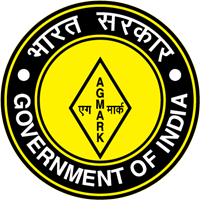 W
WAGMARK is a certification mark employed on agricultural products in India, assuring that they conform to a set of standards approved by the Directorate of Marketing and Inspection an attached Office of the Department of Agriculture, Cooperation and Farmers Welfare under Ministry of Agricultural & Farmers Welfare an agency of the Government of India. The AGMARK Head Office at Faridabad (Haryana) is legally enforced in India by the Agricultural Produce Act of 1937 . The present AGMARK standards cover quality guidelines for 222 different commodities spanning a variety of pulses, cereals, essential oils, vegetable oils, fruits and vegetables and semi-processed products like vermicelli.
 W
WThe BIS hallmark is a hallmarking system for gold as well as silver jewellery sold in India certifying the purity of the metal. It certifies that the piece of jewellery conforms to a set of standards laid by the Bureau of Indian Standards, the national standards organization of India. India is the second biggest market for gold and its jewellery.
 W
WEcomark or Eco mark is a certification mark issued by the Bureau of Indian Standards to products conforming to a set of standards aimed at the least impact on the ecosystem. The marking scheme was started in 1991. One of the purposes of the mark is increasing awareness among the consumers towards reducing environment impact. The mark is issued to various product categories and the development of standards for more products is in progress.
 W
WThe FPO mark is a certification mark mandatory on all processed fruit products sold in India such as packaged fruit beverages, fruit-jams, squashes, pickles, dehydrated fruit products, and fruit extracts, following the Food Safety and Standards Act of 2006. The FPO mark guarantees that the product was manufactured in a hygienic 'food-safe' environment, thus ensuring that the product is fit for consumption.
 W
WIndia Organic is a certification mark for organically farmed food products manufactured in India. The certification mark certifies that an organic food product conforms to the National Standards for Organic Products established in 2000.
 W
WThe ISI mark is a standards-compliance mark for industrial products in India since 1955. The mark certifies that a product conforms to an Indian standard (IS) developed by the Bureau of Indian Standards (BIS), the national standards body of India. The ISI mark is by far the most recognised certification mark in the Indian subcontinent. The ISI is an initialism of Indian Standards Institution, the name of the national standards body until 1 January 1987, when it was renamed to the Bureau of Indian Standards. The ISI mark is mandatory for certain products to be sold in India, such as many of the electrical appliances like switches, electric motors, wiring cables, heaters, kitchen appliances, etc., and other products like Portland cement, LPG valves, LPG cylinders, automotive tyres, etc. In the case of most other products, ISI marks are optional.
 W
WThe Non Polluting Vehicle mark is a mandatory certification mark required on all new motor vehicles sold in India. The mark certifies that the motor vehicle conforms to the relevant version of the Bharat Stage emission standards. This certification for a brand new vehicle has a limited validity of 6 months from the date of sale of the vehicle. After this, the vehicle has to be tested afresh. The vehicle is tested in the car companies garage during the years maintenance and a renewed certificate has to be obtained. The certificate thus issued on a used vehicle is the Pollution Under Control certificate. The sticker can be removed after the buying the vehicle.
 W
WSilk Mark is a certification mark in India for silk textiles. The mark certifies that the piece of textile which bears the mark is made of pure natural silk. The certification is managed by the 'Silk Mark Organisation of India', a society set up by the state-controlled Central Silk Board of India. Even though promoted by the government of India, the mark is only advisory in nature and is not legally endorsed. The certification scheme was founded by the Central Silk Board in 2004. In the original format, the mark included a silk mark logo woven on a hang-on tag on which a unique numbered hologram would be affixed. But the hang-on tag tended to be faked (reused) hence, a new method with the mark woven onto the textile itself has been proposed.
 W
WToxicity labels viz; red label, yellow label, blue label and green label are mandatory labels employed on pesticide containers in India identifying the level of toxicity of the contained pesticide. The schemes follows from the Insecticides Act of 1968 and the Insecticides Rules of 1971.
 W
WPackaged food and toothpaste products sold in India are required to be labelled with a mandatory mark in order to be distinguished between lacto-vegetarian and non-vegetarian. The symbol is in effect following the Food Safety and Standards Act of 2006, and got a mandatory status after the framing of the respective regulations in 2011. According to the law, vegetarian food should be identified by a green symbol and non-vegetarian food with a brown symbol.